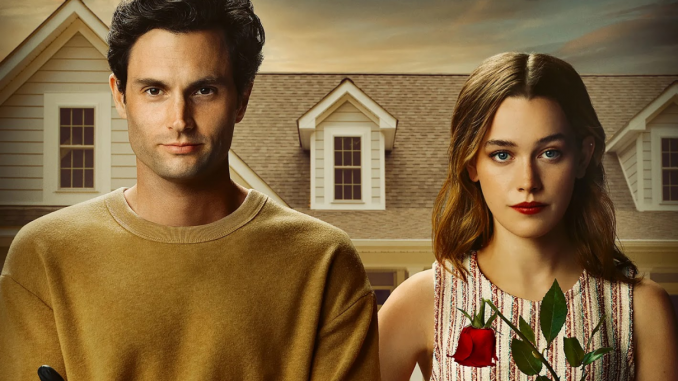
By Melissa Morales
When Netflix’s “You” was first released in 2018, it immediately became one of the most popular and trending shows in the media. The series follows protagonist Joe Goldberg who has a habit of becoming obsessed with the women he meets. He stalks them and finds ways to get close to them – even if that means killing people that pose a threat to his conquests. Eventually, when Joe finds out that the women themselves know he is obsessed with them, he usually ends up killing them too.
The show is jam-packed with twists and turns that take viewers on a wild ride. It’s mysterious, dark, and compelling, but what it also does is play into two very important topics in the entertainment industry: the romanticization of male murderers and the portrayal of women characters.
Penn Badgley, who plays Joe Goldberg, is extremely talented when it comes to playing versatile roles throughout his acting career. He is also handsome, but when looking at his character Joe, sometimes that notion of handsomeness quickly falls deeper into social media’s current trend of romanticizing and even idolizing many male murderers, abusers, and assaulters in films and TV shows.
It’s not just the “good looks” of these characters, but also their charm entwined with the darkness deemed “attractive” of their persona that concocts this romanticization of violent men in the media, that in turns excuses or dismisses their behavior and actions.
Badgley reflected on the romanization of Joe during an interview with Stephen Colbert back in 2020, saying it revealed how much viewers can “be patient and forgive someone who has a body like mine, color, gender, skin, and privileges.”
Moreover, casting decisions may also have an impact on how viewers idealize certain personas.
Many shows may tie into old notions of westernization by highlighting “dominant” white male characters, which can arguably translate to what some women in the real world may find attractive. Casting predominately white, attractive, and young actors for these “killer roles” adds to this glamourization and may lead viewers to fetishize abusive male characters. Consequently, large fan bases may form, fantasizing and idolizing these fictional violent men without questioning their morals and only looking at their appearance.
With “You,” it’s almost ironic that the majority of people romanticizing these male killers are women because the murderous protagonists they are romanticizing are abusing, victimizing, and killing women. This brings up a very interesting perception of how “You” in particular portrays women through two different lenses.
On one end of the spectrum, the show focuses on the mindset of an obsessive male murderer and the complex thought process behind his stratagems. It also specifically and explicitly reveals the particular women he tends to obsess over and victimize, which are not only victims of his abuse, but also victims of an old construed perception of women in the media.
The women Joe stalks are typically soft and submissive. Most, if not all, of the women he pursues end up becoming romantically involved with him at some point in the series. This ultimately leads to their greatest, usually fatal, downfall. Most of the women in “You” end up falling for Joe relatively quickly, with some being “damsels in distress” and accepting his assistance and advances.
Since the beginning of time, women have been seen as domesticated figures that depend on the male breadwinner of the family and cannot stand up for themselves. They are also expected to have all the desired qualities of femininity, which many of Joe’s victims exhibit. An article from Planned Parenthood goes into further detail on hyper-femininity, defining it as “the exaggeration of stereotyped behavior that’s believed to be feminine… This may include being passive, naive, sexually inexperienced, soft, flirtatious, graceful, nurturing, and accepting.”
On the other hand, however, not all of Joe’s victims fall into this category. Many of them dismantle the “traditional, submissive” role, despite some still becoming romantically involved with him at one point or another. Karen Minty from season 1, for example, doesn’t depend on Joe; she knows herself and is actually the one who initiates the relationship with him without getting caught up in his obsessive habits. Additionally, Candance Stone, who Joe believed he killed before the start of the same season, rises “back from the dead” to plot her vengeance against him. While she didn’t get to execute her plan, she still was able to unsettle him enough in his pursuit of another woman, Beck.
In season 2, we were introduced to Love Quinn, who became one of Joe’s obsessions. She breaks traditional gender roles by being capable of all the murderous things Joe does. She manages to survive Joe’s almost-murder by confessing that she is pregnant with his child. We follow Joe and Love into season 3 with their newborn son, Henry, and additionally where Joe finds a new love interest Marienne, who is very strong-minded and independent in her own right.
Though she begins to have feelings for Joe, she leaves him with her daughter from a different relationship after hearing Love’s warnings about him. This arguably subverts the “soft woman” archetype by including strong female characters as well as examples of docile ones.
Admittedly, I don’t believe this “age of romanticization” of morally wrong individuals will end anytime soon nor do I think the long-standing domestic image of women will completely vanish from the media. However, things are gradually changing and making room for progression by acknowledging these issues from shows like “You” that delves deep into these concepts and break some of the molds within them.
